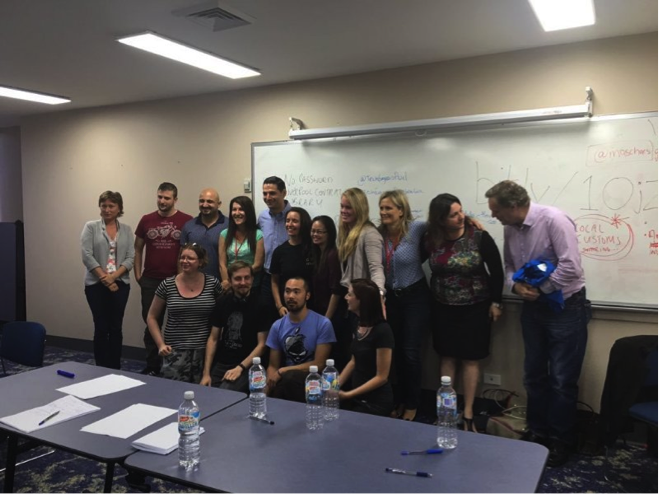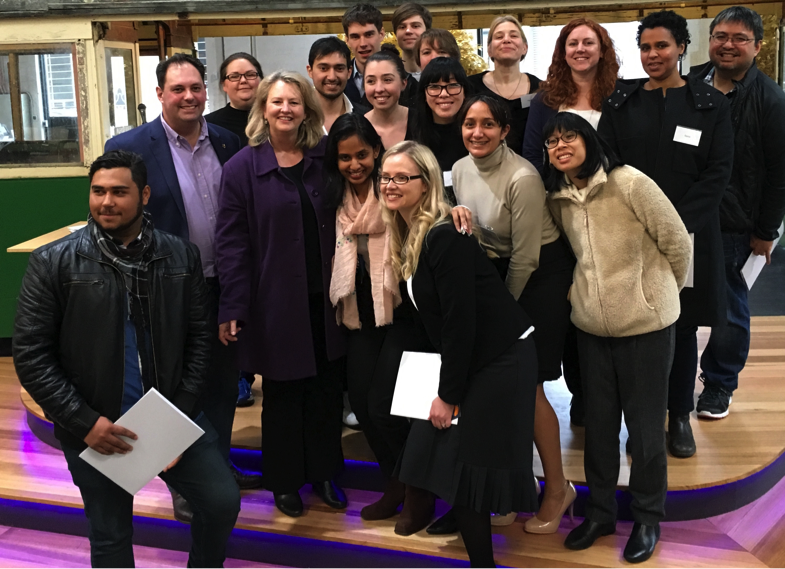Following the success of the Techfugees hackathon in Sydney in November 2015, in April the Techfugees Melbourne Hackathon brought together developers, designers and entrepreneurs to develop creative tech solutions to help refugee families settle into the Australian community.
 Melbourne Hackathon taking place. Photos courtesy of Paul Henderson-Kelly
Melbourne Hackathon taking place. Photos courtesy of Paul Henderson-Kelly
Behind Melbourne Techfugees are Shelli Trung, Lynda Ford, Lama Tayeh, Jieh-Yung Lo, Wesa Chau and Frank Arrigo, who mentored the teams over the weekend of 15 to 17 April before they pitched to a judging panel made up of tech and community leaders.
Crucial to the success of the event was the involvement of former refugees who have already settled in Australia, facilitated by the non-government partners, Red Cross and AMES. They helped the teams to deeply understand challenges faced by new settlers, a co-design approach that ensured they were finding solutions to genuine problems.
The event resulted in 15 submissions, focusing on:
- employment
- interpreting
- English language development
- data storage
- establishing social networks
- access to services
- on-arrival orientation
- work experience
- volunteering
- mentoring
- family reunification.

What happened after the event?
As all of the teams and ideas were only 48 hours old by the end of the hack and few teams included people with entrepreneurial backgrounds, there was a need to ensure that as many teams as possible had access to support to develop their skills and product.
Lynda Ford’s iGen Foundation created a free 10-week incubator called Cultov8 which included a mix of online and in person startup skills development and tech and/or business mentoring in order to assist the teams to become attractive to further formal incubation, acceleration or investment.
Five teams completed Cultov8 and pitched to a panel which included Red Cross, Launchpad (the venue donor), Geoff Gourley, a social impact investor and founder of One10, a social impact accelerator and Ishani Chattopadhyay from The Difference Incubator.
Interpreter Central and Tell Me Now flashcards were offered formal incubation, and This is Me and Friendfugees are continuing with mentoring.
WelcomeD has decided its idea is too ambitious as it relies on extensive databases that don’t yet exist and are too expensive to develop.
 Post-Techfugees Cultov8 teams with the Minister for Small Business, Trade and Innovation, Philip Dalidakis at left, second row.
Post-Techfugees Cultov8 teams with the Minister for Small Business, Trade and Innovation, Philip Dalidakis at left, second row.
What’s next for Melbourne Techfugees?
Since December 2015 we have been reaching out to government agencies to seed or invest in some of the apps. It’s a slow process because the government isn’t used to this kind of rapid innovation. But they are listening and curious.
We hope they see what we see – that the Techfugees movement is growing and providing better solutions to settlement than any government or NGO can achieve alone.
Key dates
Techfugees Australia: Young People, 4-6 November 2016
This will focus on refugee young people in Parramatta in Western Sydney. Please follow us on Twitter for the latest information: TechFugees Australia
The next Melbourne Techfugees hackathon will be held early 2017.
For more info please contact Lynda Ford, +61 414 440 483, Lynda@igenfoundation.com
We have also been approached by an NGO in QLD to run a TechFugees Australia there later this year too, so we’ll update you when we have more information.
Keep in touch
Find Techfugees Australia on Twitter, Facebook and DevPost.
Connect with Anne-Marie Elias, Annie Parker, Nicole Will and Lynda Ford on Twitter.